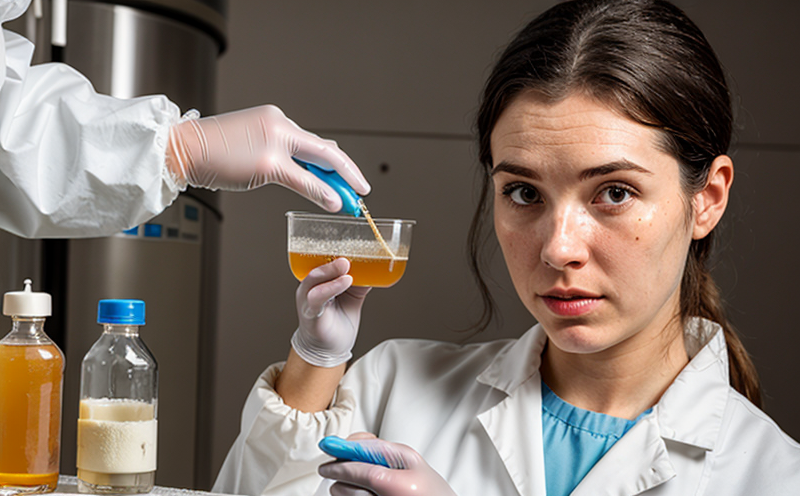ASTM E3206 Contamination Testing by Yeasts and Fungi
The ASTM E3206 standard provides a comprehensive approach to identifying contamination from yeasts and fungi in various environments, including food processing facilities, pharmaceutical manufacturing plants, and cleanroom settings. This service is pivotal for ensuring the safety and quality of products that are susceptible to microbial spoilage or contamination.
Contamination by yeasts and fungi can lead to significant economic losses, regulatory non-compliance, and potential health risks. By adhering to ASTM E3206, laboratories ensure that they meet stringent requirements set forth by international standards, thereby providing credible and reliable test results. The testing process involves the collection of samples from the environment or product, followed by a series of steps designed to isolate and identify any fungal or yeast species present.
The first step in this process is sample collection. Samples are typically collected using sterile swabs, air samplers, or other appropriate methods depending on the nature of the environment being tested. Once collected, these samples undergo initial processing to remove any non-microbial contaminants before they are inoculated onto specialized media plates designed for yeast and mold growth.
The next phase involves incubation under controlled conditions that favor the growth of yeasts and fungi. This step is critical as it allows the microorganisms to multiply sufficiently so they can be visually identified and further characterized. After the incubation period, technicians examine the plates for colonies indicative of fungal or yeast growth. Using microscopic analysis and other advanced techniques, the team then proceeds with species identification.
Species identification plays a crucial role in understanding not only what type of contamination exists but also where it originated from within the facility. This information helps facilities pinpoint areas requiring immediate attention and implement corrective actions to prevent future occurrences. For instance, if certain types of yeasts or fungi are repeatedly detected, it might indicate specific deficiencies in sanitation practices that need addressing.
ASTM E3206 also emphasizes the importance of maintaining accurate records throughout the entire testing process. These records include details about sample collection methods used, incubation conditions applied, and identification procedures followed. Maintaining such documentation ensures transparency and traceability, which are essential components for regulatory compliance.
In summary, ASTM E3206 contamination testing by yeasts and fungi offers a robust framework for identifying and addressing microbial contamination issues effectively. By leveraging this standard, organizations can enhance their product safety protocols while ensuring adherence to industry best practices.
Applied Standards
| Standard | Description |
|---|---|
| ASTM E3206 | Method for Determining Yeast and Mold Contamination in Environmental Samples. |
| ISO 11731 | Determination of Yeasts in Foods by Membrane Filtration on Agar Media. |
| EN ISO 25948-2 | Analyses of Fungi and Yeasts - Part 2: Identification Methods. |
Eurolab Advantages
EuroLab offers unparalleled expertise in performing ASTM E3206 contamination testing by yeasts and fungi. Our highly trained professionals possess extensive knowledge of both the standard itself as well as various methodologies employed within it. This allows us to provide accurate, reliable results consistently across all projects.
We utilize state-of-the-art equipment capable of detecting even trace amounts of contaminants, ensuring no stone is left unturned when investigating potential issues. Additionally, our comprehensive approach includes not just the identification phase but also recommendations for corrective measures based on findings from each project.
At EuroLab, we pride ourselves on delivering more than just test results; we offer actionable insights that help clients improve their operations and maintain high standards of hygiene and safety. Whether you're dealing with food production facilities or pharmaceutical manufacturing plants, our services are tailored to meet your unique needs.
Environmental and Sustainability Contributions
EuroLab's commitment to sustainability extends beyond just providing top-notch testing services; it encompasses all aspects of how we operate. By offering ASTM E3206 contamination testing by yeasts and fungi, we contribute significantly towards creating safer environments for everyone involved in production processes.
Through our rigorous testing procedures, we help prevent product spoilage due to microbial activities, which reduces waste generation and saves resources. Furthermore, identifying early signs of contamination enables facilities to address problems promptly, minimizing the need for extensive interventions later on.
In conclusion, EuroLab's services play a vital role in promoting environmental responsibility by contributing towards cleaner production processes and healthier working conditions. Our dedication to sustainability aligns perfectly with our mission to serve clients across diverse sectors effectively.





